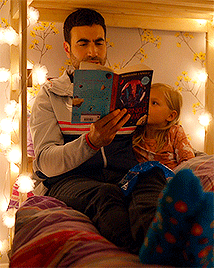The Work is the Way
Mood Tools Week 6: Use Writing Mantras to Stay Focused
The Mood Tools series started with a piece about befriending your inner critic. I talked about a stuffed monster I bought. It was a whole thing.
But let’s face it.
Some of the messages from our inner critic can be tenacious AF.
Tenacious enough that even after befriending them, they continue to grumble and complain. If there was a person this toxic in your life, you’d distance yourself from them, but our inner critics are pernicious little pricks running circles around our writerly hearts as they scream—“This sucks! This sucks! This sucks!”—with all the energy of Amy Poehler’s SNL character Kaitlyn running around her stepdad as she screams, “Rick! Rick! Rick! Rick! Rick!”1
When our inner Kaitlyns decide to run2 with a particularly loud bit of criticism, I’ve found it’s best to replace Kaitlyn’s message with a mantra in the hopes she’ll run3 with that instead.
After eight drafts, my first (fully revised) novel, Misfit Kings, got benched after querying. The consensus from agents who read the full was that while a story about three misfit Elvis impersonators who learn that life can’t be lived in another man's spotlight would be a strong second book, the premise was too niche to market as a debut, so what else did I have?
What I had was a concussion from banging my head against the wall.
I’ve since come to see this response for the open door it was, but in the moment, I was devastated that the finish line I thought I was closing in on had been pushed several years into the future.
I bought what can only be described as a ginormous plastic box, filled it with all my drafts, notes, and research books, and then promptly realized I could neither lift this coffin-sized behemoth myself nor actually maneuver it down the tight staircase leading to our basement. My husband and I had to take it down the front steps, carry it around the building, and sneak it through the bulkhead.
As we found a place to bury the detritus of Misfit Kings among all the other basement castaways, I tried to crack a joke about serving as pallbearers for my book, but the only thing that cracked was my voice.
I did my best to move on—New class! New book! New characters!—but no matter how much progress I made, Kaitlyn was there to remind me that, in actual fact, I sucked, I sucked, I sucked!
A saner person might have quit, but I got mad. Writing isn’t just the way I make sense of my world, it’s my love language (as anyone who has received an embarrassingly long email from me can attest), so why was I letting this pernicious little pre-teen shit all over me unchecked?
So I checked her.
Imagine a montage of heart to hearts with writer friends, long journal entries, angry walks, and therapy sessions where my long-suffering counselor added failure to the long list of things that caused me anxiety. I don’t mean to be flip by mentioning this montage—quite the opposite. Too often in these kinds of essays writers skip over the work to get straight to the epiphany, a practice which, while efficient, is a lie. Even though this essay isn’t about the work I did to get to the coming epiphany, I still wanted to make sure anyone currently being shit upon by the pernicious pre-teens in their minds felt seen in these pages. So, if you’re currently doing the work, stick with it because the world is better for every person who finds a way to keep writing, yeah?
Yeah.
That said, I did eventually check Kaitlyn by asking myself why I even cared about publishing so much. What was it exactly about publishing a book that was so important that not doing it felt like a funeral? What did I think publishing would bring me besides the satisfaction of holding the book in my hand as a tangible manifestation of all that work?
I was surprised to find I had a ready answer: publishing a novel would bring me a writing life and a community. I remember blinking at that answer, completely confused because I was—and remain—an unpublished novelist, but I had—and still have—a writing community (I wrote about a slice of that very community in “It Takes a Village” last week, in fact). And I absolutely had—and still have—a full writing life. While publishing a novel will certainly expand my writing community, not publishing a novel won't rip away the writing community I already hold dear. And while I’d be lying if I said that publishing doesn’t still matter to me—I very much want to hold a copy of my published book one day—the fact that Misfit Kings hasn’t been published yet doesn’t change the fact that I wrote it, I’m proud of it, and the ending made my Roy-Kent-esque husband cry.4
I’m currently writing a novel about a female close-up sleight of hand magician, but none of her magic can hold a candle to the magic of realizing that I already have the writing life I once thought publication would give me.
But while this realization allowed me to write in peace for a good and glorious stretch of time, we’ve already established that anxiety can be a pernicious pest—it’s pretty much her whole brand—so eventually the whispered doubts returned:
Don’t you think that your new character’s too grumpy to carry a book?
Don’t you think it’s risky to write about another subculture given your first book was too niche?
Don’t you know this structure is out of fashion ?
Don’t you think this device limits the scope of the book?
Don’t you think the scope of this book is too small for current publishing tastes?
Don’t you think you’ve bitten off more than you can chew?
Don’t you think you should ixnay clichés like bit off more than you can chew?
The quiet answer to every one of these questions was yes. The louder answer, though, was WOULD YOU SHUT UP ABOUT THE FINISHED DRAFT WHILE I’M STILL WRESTLING THE FIRST?!
When this outburst actually shut up that pernicious little pre-teen, my mantra habit was born.
Any time Kaitlyn started to pipe up about market questions, I shook my head and said, “Process, not product.”
Any time Kaitlyn started to crank the doubt engine, I shook my head and said, “Diligence, not doubt.”
Silly, sure.
But a mantra isn’t meant to be a rallying cry that inspires an auditorium. A mantra’s more personal than that. A hug of a pep talk, really. A cheat code that refocuses our anxious minds on our writing. Because it’s completely unproductive to wring our hands over the whims of the market when we need to rework our sticky widget scenes, a mantra gets us back to unsticking those widgets.
Over time I’ve settled into the work is the way as a one-stop mantra that reminds me that the only way to stop my hands from wringing about by novel is to write it.
If I’m not sure a chapter is going to work as I’ve structured it, I need to write it—the work is the way.
If I start to worry this book, too, will fail, I need to remind myself the book will certainly fail if I don’t finish it—the work is the way.
And now when I can count the number of chapters in this draft I have left to write, my inner critic is in the throes of a four-alarm panic that I’ll botch the ending, I need to power through—the work is absolutely the way because the only literary sin greater than a botched ending is an unfinished ending.
If any of these mantras sing to you—Diligence, not doubt! Process, not product! The work is the way!—you’re welcome to try them, but I suspect these mantras only work for me because they’re an organic response to my personal cocktail of writerly worries.
To find your mantras, listen to the hissing messages of your own critic and consider what message might counter those messages best. For example, an inner critic who keeps moaning that’s it’s gonna take forever to revise the mess of a draft you’re writing might be quieted by a mantra uttered with every once of Pacino’s passion: I’m Drafting Here!
And given the way I’m grinning at the gif looping above, I suspect own my mantra’s may morph into I’M WORKIN’ HERE for at least a little while.
Perhaps I’ll even slap my desk for good measure.
Take Away from Mood Tools Week 6: The Work is the Way
But a mantra isn’t meant to be a rallying cry that inspires an auditorium. A mantra’s more personal than that. A hug of a pep talk, really. A cheat code that refocuses our anxious minds on our writing.
Because it’s completely unproductive to wring our hands over the whims of the market when we need to rework our sticky widget scenes, a mantra gets us back to unsticking those widgets.
UNINTENTIONAL PUN!!
Totally intentional pun—I’ll show myself out!





This piece is so good. I don’t write fiction but the inner critic doesn’t care about genre. At the same time, it IS good to be able to connect directly with readers via Substack. It’s been very empowering for me (Mama Ephemera’s Muddy Feet: kellylenox.Substack.com). It’s helped me keep writing after poetry went AWOL, and it’s so great to find writers like you on here! Thank you. <3
I think you know my story about looking up the bonfire regulations for when I was planning to burn all the manuscripts and quit.